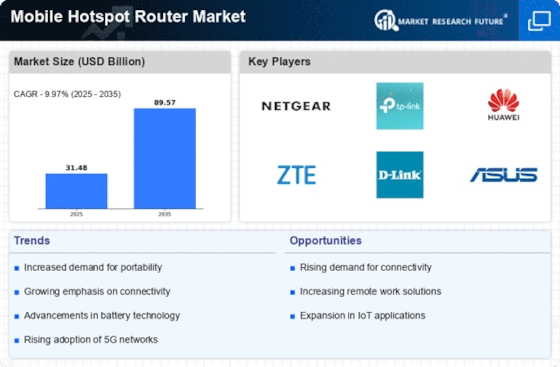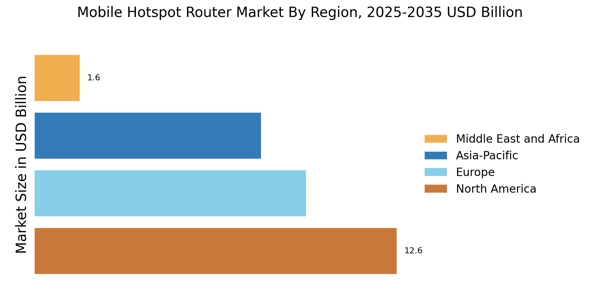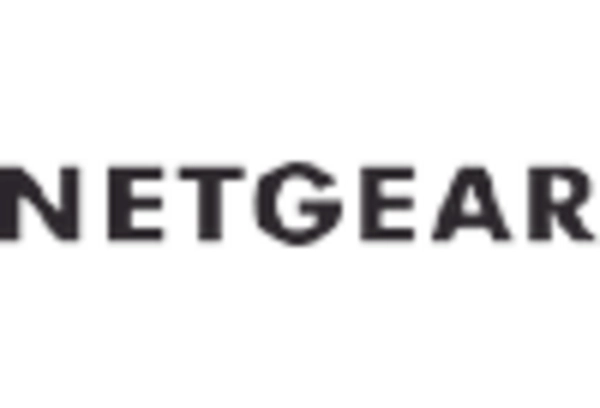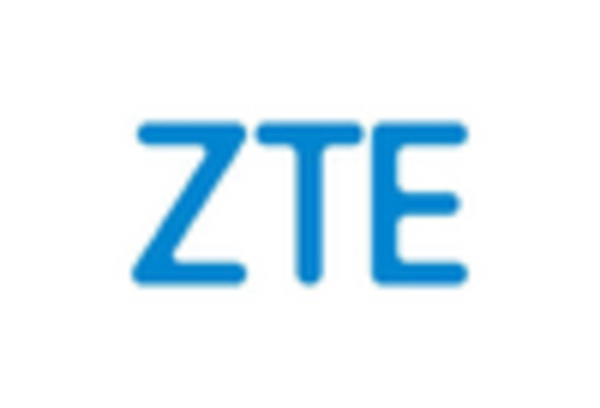Rising Adoption of IoT Devices
The proliferation of Internet of Things (IoT) devices is significantly influencing the Mobile Hotspot Router Market. As more devices become interconnected, the demand for reliable internet access to support these technologies is escalating. It is estimated that there will be over 30 billion connected IoT devices by 2025, creating a substantial need for mobile hotspot routers that can provide stable and secure internet connections. This trend is particularly evident in sectors such as smart homes, healthcare, and industrial automation, where consistent connectivity is essential for device functionality. The Mobile Hotspot Router Market stands to benefit from this growing ecosystem, as consumers and businesses seek solutions that can accommodate the increasing number of connected devices.
Growing Focus on Security Features
Security concerns are increasingly shaping consumer preferences within the Mobile Hotspot Router Market. As cyber threats become more sophisticated, users are prioritizing devices that offer robust security features. Manufacturers are responding by integrating advanced encryption protocols and secure access controls into their mobile hotspot routers. Market analysis suggests that consumers are willing to invest in devices that provide enhanced security, particularly for sensitive data transmission. This focus on security is likely to drive innovation within the Mobile Hotspot Router Market, as companies strive to differentiate their products through superior security offerings. As a result, the market may witness a shift towards devices that not only provide connectivity but also ensure the protection of user data.
Shift Towards Remote Work and Learning
The shift towards remote work and online learning is a significant driver for the Mobile Hotspot Router Market. As organizations and educational institutions adapt to new operational models, the need for reliable internet access has become critical. Data indicates that remote work is likely to remain a prevalent practice, with a substantial percentage of the workforce continuing to work from home. This trend necessitates the use of mobile hotspot routers to ensure uninterrupted connectivity for employees and students alike. The Mobile Hotspot Router Market is thus experiencing increased demand as individuals seek portable solutions that facilitate effective communication and collaboration in remote settings. This shift is expected to sustain growth in the market as more users recognize the value of mobile internet solutions.
Increased Demand for Mobile Connectivity
The Mobile Hotspot Router Market is experiencing a surge in demand for mobile connectivity solutions. As individuals and businesses increasingly rely on internet access for daily operations, the need for portable and reliable internet solutions has become paramount. According to recent data, the number of mobile internet users is projected to reach 5 billion by 2025, indicating a substantial market opportunity. This trend is driven by the growing adoption of remote work and the need for seamless connectivity while on the go. Consequently, mobile hotspot routers are becoming essential tools for maintaining productivity and communication in various sectors, including education, healthcare, and business. The Mobile Hotspot Router Market is thus positioned to benefit from this increasing demand, as consumers seek devices that offer high-speed internet access in diverse environments.
Technological Innovations in Mobile Hotspot Routers
Technological advancements play a crucial role in shaping the Mobile Hotspot Router Market. Innovations such as 5G technology are enhancing the capabilities of mobile hotspot routers, allowing for faster data speeds and improved connectivity. The introduction of advanced features, such as dual-band support and enhanced battery life, is also attracting consumers. Market data suggests that the 5G segment is expected to grow significantly, with projections indicating that 5G connections will surpass 1 billion by 2025. This shift towards more sophisticated technology is likely to drive competition among manufacturers, leading to the development of more efficient and user-friendly devices. As a result, the Mobile Hotspot Router Market is poised for growth, as consumers increasingly seek out devices that leverage the latest technological advancements.

















